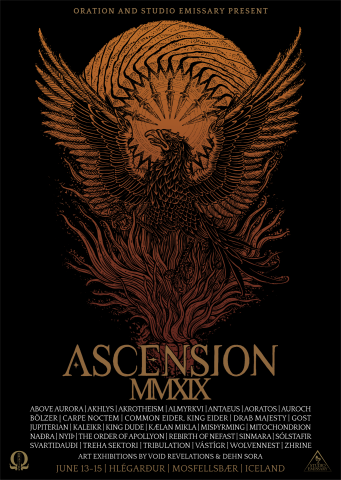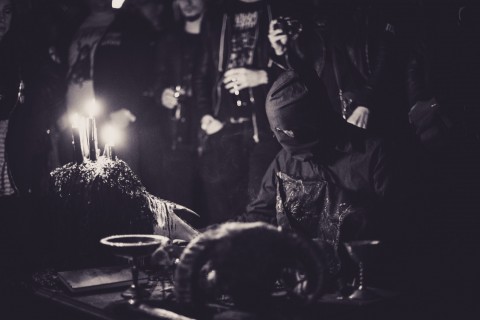Interview with one of the main catalysts in the Icelandic scene Stephen Lockhart
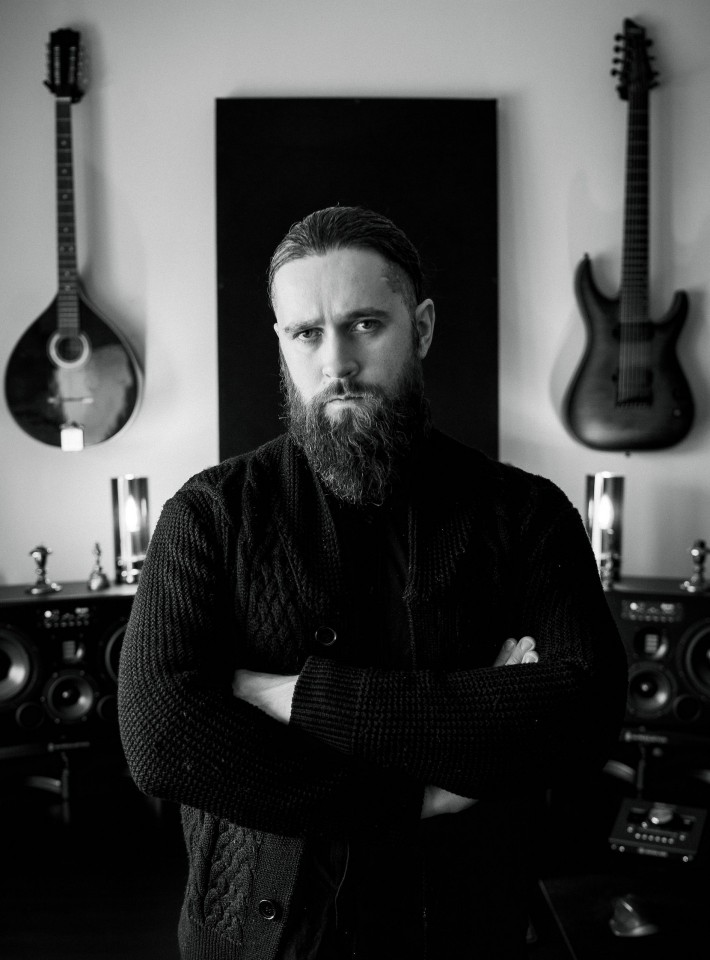
En fleira er mönnum til hugganar en fébætur einar. "There are more things to be thought of by men than money alone" — The Saga of Grettir, chapter 47
We caught up with Stephen Lockhart, the mastermind behind Rebirth of Nefast, Studio Emissary, Oration (his record label) and the soon to come Ascension fest. In this interview, we’ll explore the many projects and influences that he has had and his goals behind them.
For those unfamiliar with who you are, what's your background?
Stephen Lockhart: I'm an Irishman living in Iceland for the last eleven years. Though I am most known for production work with Studio Emissary and Icelandic Black metal bands, my previous education and career was actually in forestry (more specifically, forest science). I studied this for four years and worked a further four years before my passion for music was able to take precedent and paved the way for my current occupation. I currently run and own Studio Emissary, Oration Records and Ascension Festival Iceland. I have also been active in several bands both live and on record, though my main project is and always has been Rebirth of Nefast.
How did your move to Iceland from Ireland happen?
Stephen Lockhart: I first came to Iceland during the summer of 2007 on a work exchange program with my University. I took an immediate liking to living here and in the summer of 2008, I moved here permanently.
You've had a large part to play in the Icelandic scene, how did that begin? And in your opinion, how has your role developed within the scene, from what I’ve seen you have become almost a linchpin within the scene, what do you think has fuelled that and is it something you consciously chose to pursue or did it happen organically?
Stephen Lockhart: When I arrived in Iceland, I was in the latter stages of completing the Rebirth of Nefast side of the "Ex Nihilio" (the split release with Slidhr). I’d also just released the "Only Death" demo late the previous year — so, when I first met Sturla and Þórir (of Svartidauði), they were already aware of my work and who I was. I went on to do some work with a few local bands before eventually being asked to produce "Flesh Cathedral" [the debut full-length album of Svartidauði — Noizr]. I guess the rest is history.
I can't really say what my role is within the scene, to be honest, it’s not my place. I am aware, however, that there are some who consider me as some sort of figurehead, which I find somewhat baffling. To me, I don't really feel like I'm doing anything a whole lot different than what I've always done. The only difference now is there is more interest in and recognition for my work, and yes everything is on a larger scale. But to me, I've always just done what I can to help bands and individuals I believe in, while running these aforementioned ventures with the same dedication and passion put into every endeavor I feel worthwhile.
A lot of this has happened organically yes, but everything stems from a need to create. Whether it be studio work, my own projects, a festival or the record label, I always need to be doing something that fulfills this urge. But it's not just that, I've also built these ventures up in a manner that allows me to put bread on the table without having to answer to anyone but myself. This in itself is hugely satisfying. I make a living doing a variety of things I love with little to no compromise. The goal is to continue to do so.
In your opinion what is it about the Icelandic scene that fuels such consistent art? For those on the outside, I think many would assess it as pound-for-pound the best black metal scene in the world currently.
Stephen Lockhart: It’s very hard to say. If I or anyone else could, then I imagine every country would have a scene as prolific as that of Iceland’s right now. But of course, we can speculate. For starters, the general mentality here is that everyone is encouraged to have interests and hobbies from a young age. Being idle doesn’t seem to be in the psyche of most Icelanders. Hence, apparently, everyone plays an instrument or is in a band.
The other possibility is the close proximity of successful bands. You can go to the grocery store and see Björk, you can go to a bar and meet the guys in the bands you look up to. In other words, these people who’ve achieved something you might want to achieve are somehow more real, for better or worse, perhaps making it that little bit more encouraging to go on and try something yourself as opposed to idolizing bands and watching from afar.
Iceland is known for having a strong heritage, with the 'Viking mentality' of being pioneers, resilient/hardy against the elements and embracing the 'challenging' natural environment, as someone who has become embedded into that culture do you think it affects the musicianship? If so, in what ways?
Stephen Lockhart: Again hard to say, but if I were forced to, I would say no, at least not in any way I’m aware of. Perhaps there is an affect on some subconscious level, with the mentality of being resilient somehow ingrained through upbringing, but on a day to day level, I at least don’t find it hard to live here. Sure, I’d settle for better weather, but I’m not about to go write an album about it.
How did Studio Emissary begin?
Stephen Lockhart: It started out of necessity. When I began writing music, it was always a solitary affair. It might come as a surprise, considering how 'connected' I may appear in the Icelandic scene, that in Ireland (before I left), I was not connected in the slightest. I didn't rehearse with bands, I didn't know anyone with studios. One of my few contacts was Joseph Deegan [Irish musician and artist — Noizr]. He introduced me to a few concepts of recording and from there, I went on to record, albeit sporadically, the Rebirth of Nefast demo "Only Death".
I would go on to work on a few more releases, my skill-set always improving as I did so. Needless to say, with each improvement, came the need for new equipment. This eventually led to me buying a couple of audio interfaces and mics. Suddenly, I was equipped to record rather large drum set-ups. The word spread around and it all basically grew out of that.
I never set out with the idea of producing bands for a living. I started out recording because I needed to record my own music and the only person I fully trusted to do so, was yours truly. I considered producing a hobby. It was only around the time of producing Svartidauði's "Flesh Cathedral" that I decided it was something I wanted to do as an occupation.
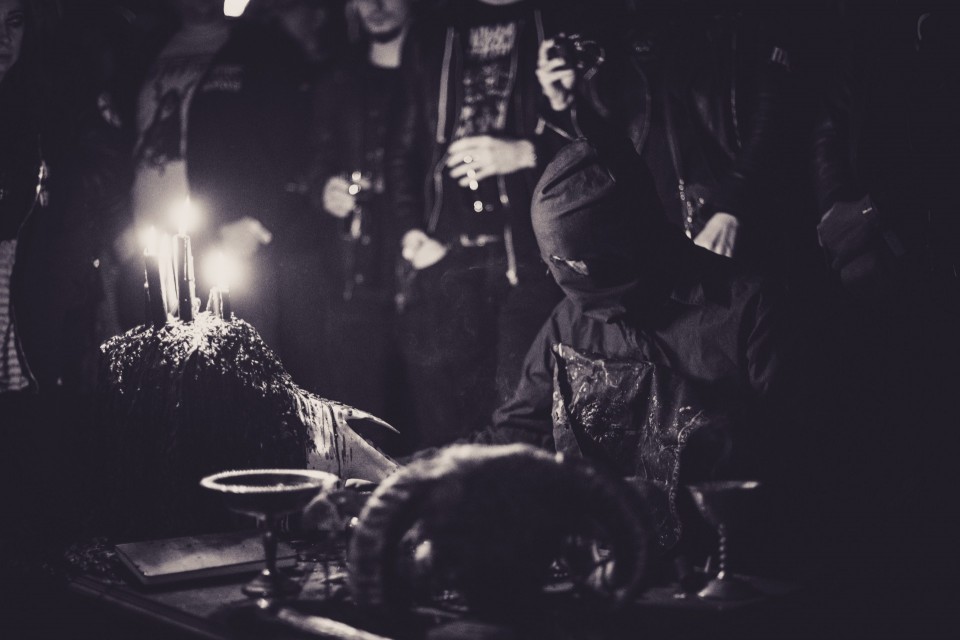
NYIÞ at Oration Fest, 2018. Photo by Void Photography
What are the plans for the future of the Studio Emissary?
Stephen Lockhart: We are actually very far into the process of designing a home, which we intend to build within the next 18 months. Part of this structure will house the new Studio Emissary. That is all I want to say on that for now, as these things have a tendency to take longer than expected and change direction. Let's just say we have big plans!
As a studio and producer how much of a balance is your approach in terms of financial/artistic interest. I.e. are there acts you wouldn’t work with because you don’t think the work is worth putting your name to?
Stephen Lockhart: I’ve been quite lucky in terms of bands I’ve worked with of late. With greater status, also comes better bands and musicians. But in any case, I don’t so much decline projects due to personal tastes, so much as I do the personalities behind them and their level of seriousness. I’d far rather work with respectful, talented musicians playing music that doesn’t necessarily stimulate my personal taste, than work with obnoxious amateurs who somehow string together decent black metal.
At this point in my career, it's quite easy to size up prospective clients in terms of collaboration compatibility. If I get a vibe early on that a client is going to be difficult to work with, I'll just not work with them. It's just not in anybody's interest. If I'm going to sculpt someone's art into something that is a true manifestation of their vision, then we need to be able to communicate well, otherwise, the collaboration is doomed to fail and both parties will walk away feeling wronged.
Who has been your biggest inspirations as a musician and a producer?
Stephen Lockhart: Not so much as a producer of other people’s music, but of his own – Mike Oldfield [an intro of Oldfield’s album "Tubular Bells" was used as "The Exorcist" movie soundtrack — Noizr]. I'm the youngest of 9 children and am very lucky to have had very musical upbringing. No one in my immediate family plays an instrument, but I was always exposed to a vast array of musical genres spanning several decades. Mike Oldfield is one of the first musicians to ever have an influence on me. Brian Eno, Alan Parsons would also be up there in terms of production work. One extremely important album for me growing up was also Jeff Waynes musical version of "The War of the Worlds". When I first heard this album at age six or seven, it was probably the first album to provide this eerie, yet wholly fascinating aura I would go on to appreciate in later years.
It's probably surprising for most to hear that as a musician, I haven't really been influenced by other metal musicians in at least the last decade. My late teens and early 20's were the formative years in that sense. Now, I listen to whatever resonates with me, regardless of genre. Very often, that can be the polar opposite of aggressive and dark music. One side effect of working on dark and heavy music all day, is that when you get home, you very often just want to give your ears a rest and listen to something non-abrasive.
Rebirth of Nefast "Tabernaculum" took a long time since the initial demos to materialize. What went into that album and how long was spent on writing and arranging it?
Stephen Lockhart: That is an impossible question to answer with accuracy – but certainly, thousands and thousands of hours. As for what went into it? Everything. Blood, sweat, my sanity, the sanity of those close to me. But to be clear, it wasn't a constant process. It took nine years to complete after "Ex Nihilio", but it was only the last year of production that was extremely obsessive and intense.
When writing for that project how do you approach the writing process?
Stephen Lockhart: It varies – though it generally stems from smaller ideas that spiral into something else. I take an idea and experiment with it, build on it and see where it takes me. Very often it leads into new parts being written around that and before I know it, I have a song. Sometimes it can take months or years, other times I’ll sit down and write the bones of a whole song in one day.
I also like to allow a lot of time for ideas to digest. Perhaps I will spend a day working on something and by the end of the day, I might either hate it or think it's entirely monumental and groundbreaking. In any case, I will leave it for some time and come back to it with fresh ears. That gives me a true impression of the materials worth.
Are you currently working on new Rebirth of Nefast material? When do you think new material will arise in release?
Stephen Lockhart: I am, but I’ll not say more than that. When it will materialize, who knows…
When you perform with the band how do you decide how your set will be structured? Will you be incorporating new material at Ascension?
Stephen Lockhart: That’s quite easy actually, as most songs are so long, we can normally only fit in about four! So it normally comes down to whatever songs are good to open/close with, then whatever fits in between. Most Rebirth of Nefast songs are quite dynamic, so it's not so much a case of choosing a slow song here and a fast song there. It's just whatever we're in the mood for playing.
Your festivals — how did they begin? What fuelled the desire to create them?
Stephen Lockhart: Oration MMXVI was our first festival. It grew out of what was originally intended to be a Studio Emissary showcase gig. Early into planning it, however, it quickly developed into something larger, with some foreign and non-studio related bands. The festival was a great success. Quite honestly, we were elated with the outcome, so much so, we decided to continue with further editions.
Oration was your previous fest, what do you think went well about the fest and what are you planning to change from last year for Ascension.
Stephen Lockhart: There is little that didn’t go well with any of our festivals, but we can always strive to do more and do it better. The festival is held in Mosfellsbær this year, which by not-Icelandic standards, is effectively a suburb of Reykjavík. It is, however, much more situated in nature than where we previously held the Oration festivals. The venue itself, Hlégarður is better equipped, we're hosting 50% more bands, it's in the summer, there’s camping, buses, midnight sun, our own catering, art exhibitions...the list of differences goes on.
A very basic question but what is Ascension fest, who organizes it and what is the vision for the fest?
Stephen Lockhart: Ascension is a festival celebrating the darker extremes of sonic art. It is organised by myself and my better half, Edda. Our goal is to provide an experience that will utterly captivate anyone who attends in a manner they'll not likely forget.
The line-up for the fest is (at least to my taste) is the best that has been seen for a long time, was it hard to get the line-up for Ascension fest? What decisions go into selecting bands for the fest?
Stephen Lockhart: It’s always a process putting together a line-up — a delicate mix of diplomacy, persistence, patience and most important at all, the sense of what a good line-up actually looks like. For us, it’s of the utmost importance that the line-up is coherent in accordance with our vision.
What do you think separates Oration/Ascension from some of the other more established festivals or even more niche fests like Maryland Deathfest for instance?
Stephen Lockhart: That’s perhaps not for us to say, but I’ll give it a shot. There are obvious elements, such as location and emphases of certain genres, but I suspect, the difference is the vibe and atmosphere. Something that a lot of non-Icelanders don’t grasp is just how small this place is, not geographically, but in the sense of the community. We’re trying to present something that has never been done here, and the Icelanders who attend really do appreciate that. This appreciation seems to radiate throughout our festivals. Similarly, I should point out that this is not the cheapest or easiest place in the world to get to, so those who do make the effort to attend, they really do want to be here. It’s not like a casual festival on the mainland where attending or not attending is merely determined by whether you fancy a road trip or not – this experience is an actual investment. Simply put, those who attend our festivals go out of their way to do so. And it really shows – we see it, other attendees see it, the venue staff sees it.
Black metal festival Ascension to be held on June 13-15 in Iceland. Tickets for 14,900 Kr (around €107 / $123) are available for order here.
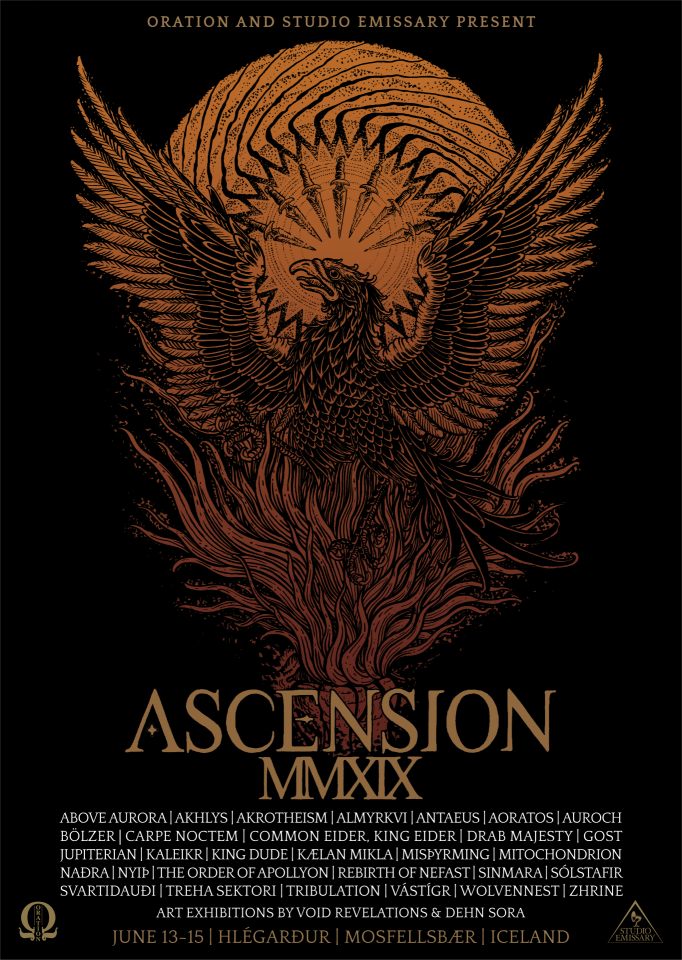
Interviewed by Dan Thaumitan
